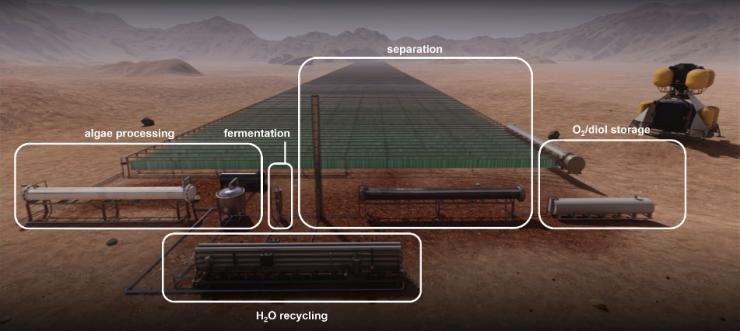NASA Funds Exploration into Making Rocket Fuel on Mars
Sep 18, 2020 — Atlanta, GA

The production of a Martian biofuel from CO2 involves four modules: algae cultivation to convert CO2 to glucose, algae processing to release the stored glucose from the algal biomass, fermentation to convert glucose to the desired biofuel and separation of the biofuel for burning in a Mars ascent vehicle (MAV). Other key parts of the process include H2O recycling to maximize the use of limited Martian water and O2 storage to capture excess photosynthetic oxygen for redistribution to other parts of a Martian colony. (Picture credit: BOKO mobile study)
Nick Kruyer, a PhD candidate in the School of Chemical and Biomolecular Engineering and former RBI fellow, is part of a multi-disciplinary team exploring the renewable production of rocket fuel on Mars. The project, Fueling a Human Mission to Mars, is a collaborative effort by the groups of Caroline Genzale (Mechanical Engineering), Wenting Sun (Aerospace Engineering), and Pamela Peralta-Yahya (Chemistry and Biochemistry, PSE faculty). Dr. Genzale will present the group’s preliminary findings at next week’s NASA Innovative Advanced Concepts (NIAC) Virtual Symposium. The project is sponsored by a recently received Phase 1 NIAC funding award.
The goal of this project is to engineer production of a renewable, liquid, rocket propellant on Mars. In situ production of rocket propellant has the opportunity to reduce initial payloads from Earth, reducing launch costs by billions of dollars. The process centers around photosynthetically grown algae, cultivated using Martian carbon dioxide and sunlight, and feeding the digested algal biomass to an engineered microbe to produce rocket fuel. Preliminary research has identified diols as good fuel candidates based on their liquid state under average Martian conditions and theoretical combustion properties. The presence of oxygen atoms in the diols reduces oxidant demand and promotes a cleaner burn, potentially allowing reuse of rocket engines for multiple ascents. “It’s been really interesting to think about a chemical engineering problem in the context of Mars,” said Kruyer. “It changes all the assumptions and requires us to come up with creative solutions to problems that would already be ‘solved’ on Earth. I like the opportunity to take something science fiction and make it a reality.”

Nick Kruyer, graduate student ChBE
Walter Rich




